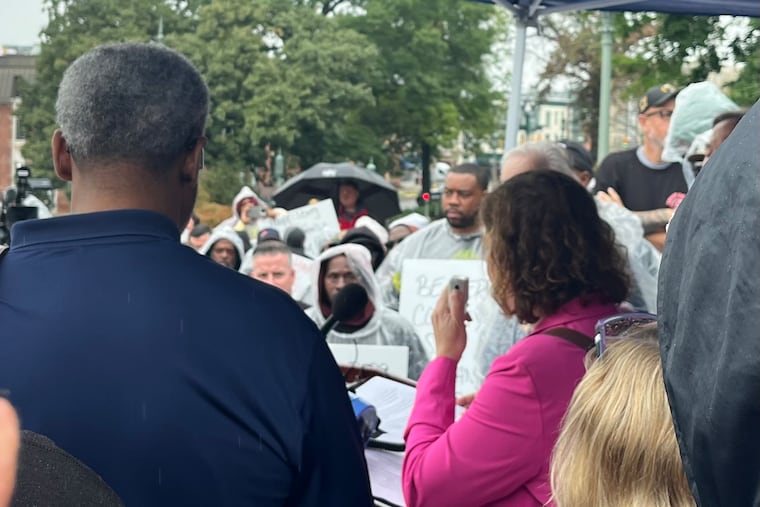Transportation funding is needed ASAP, transit agencies, unions, and business leaders tell Pa. legislators
Without more state money, SEPTA and other public transit agencies in Pennsylvania must decide soon on service cuts. Roads and bridges need money, too. Time is running short for action.

HARRISBURG — The state AFL-CIO and the Chamber of Commerce for Greater Philadelphia. Democrats and Republicans. Transit systems from every corner of Pennsylvania, city and rural, and the Associated Highway Contractors. Transport Workers Union Local 234′s president shoulder to shoulder with SEPTA’s chief executive and general manager.
These sometime rivals united Tuesday on the steps of the Capitol to implore lawmakers to reach a deal on state transportation funding that will keep public transit systems like SEPTA from deep service cuts.
“Everyone is coming together because we understand what infrastructure means to the commonwealth,” said Anselm Sauter, vice president of regional advocacy at the Chamber of Commerce for Greater Philadelphia, which has made securing transit funding a top lobbying priority.
The broad coalition reflected a growing consensus that the solution may lie in a grand bargain that combines more mass transit funding with new state money for roads and bridges, which are in bad repair in many places.
“We are at a crisis. We are at a crossroad,” Sauter told the crowd of about 250 standing in a soft rain to raise their voices. “We need to invest in our transportation infrastructure, or Pennsylvania falls behind, loses jobs, starts to spiral.”
SEPTA entered this year with a $240 million operating budget deficit as federal American Rescue Plan pandemic funds run out. Representatives of smaller transit agencies based in Northwest Pennsylvania and York testified earlier in the day before the state Senate Transportation Committee that they are experiencing their own financial challenges in recovering from the pandemic.
» READ MORE: The PA Turnpike has kept transit afloat for years. Now what?
The House, which Democrats control by a one-vote majority, passed Gov. Shapiro’s proposal to pump $283 million into the Public Transportation Trust Fund by increasing the annual allocation of state sales-tax revenue it receives. That would have brought about $161 million to SEPTA for the 2025 fiscal year.
Senate Republican leaders insisted that any new mass transit funding would need to include spending for highway and bridge infrastructure and other transportation needs such as regional and local airports, too. The Senate did not vote on Shapiro’s plan, so it was not included in the state budget that passed in July.
“Call the vote! Call the vote!” the crowd chanted, along with “Union Power” and “Do your job! Do your job!” — the latter directed to the Senate.
Transport Workers Local 234 of Philadelphia, SEPTA’s largest labor union, organized the rally, timed for the first day of the General Assembly’s abbreviated preelection session. It drew building trades unions from across the state whose members would get work from increased bridge and road spending, the Amalgamated Transit Union from Pittsburgh, and lawmakers from both parties.
“We urge lawmakers to come together now in October, while there is still time,” said Leslie S. Richards, SEPTA CEO and general manager, standing next to TWU Local 234 President Brian Pollitt. “Raise your voices and let them know you are prepared to work until the last possible moment.”
Lawmakers tucked into the budget a stopgap funding measure that allotted $80.5 million for the highways and bridges and $80.5 million for transit. SEPTA got $46 million, plus $6.9 million in local matching funds from Philadelphia and the four suburban counties.
It’s not clear whether there is enough time to put together a comprehensive transportation funding bill supporting bridges and roads and transit before the legislature adjourns Nov. 30. (It breaks after next week so senators and representatives can go to their districts to campaign.)
Most people working on the issue, including lawmakers, are skeptical such a deal can be reached soon. For one thing, there are disagreements about what revenue stream (or combination of them) to use. Some GOP senators, who hold the balance of power on this issue, are trying to pass legislation that would regulate and tax skill games — but there are internal disagreements on how to do it.
Skill games are slot machine look-alikes, which have popped up in bars, taverns, convenience stores, and corner bodegas. They exist in a legal gray area, and how many of the games are operating is unknown.
Still, there is growing support for making a deal, perhaps early next year during state budget negotiations. Whether SEPTA and other transit agencies can wait that long without having to cut service and raise fares is unclear.
Pittsburgh bus driver Karima K. Howard addressed the lawmakers, both those present at the rally and those in the Capitol building behind her.
“We drive the people around. You guys were elected by the people, for the people,” said Howard, vice president of ATU Local 85. “Once again, do your job, so we can go and do our job.”